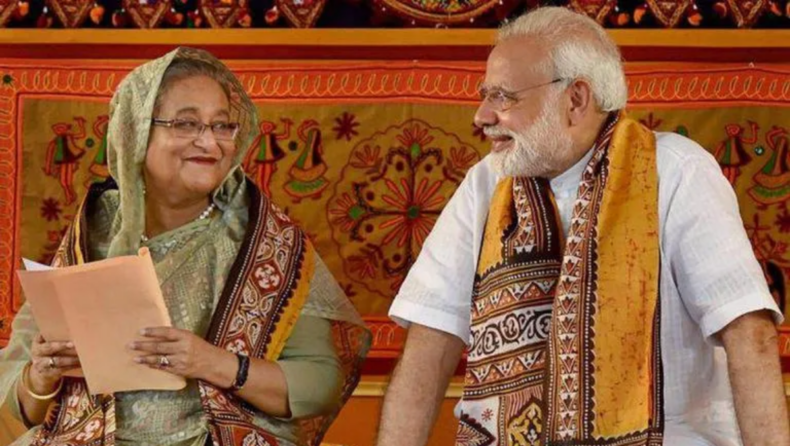A number of issues are on the agenda of discussion, security cooperation, water sharing of common rivers, border management, and combating human trafficking are among the priority talks between PM Sheikh Hasina and Narendra Modi.
Bangladesh prime minister Sheikh Hasina landed in India on Monday on a four-day visit with a lot of agendas on the table. A significant issue which remains on the top shelf for discussion is the issue of water sharing from the Teesta River.
India has a robust relationship with Bangladesh especially flourished when prime minister Hasina came into power in 2009. India has benefitted thereafter on many fronts such as the issue of security.
Within hours of arriving in India, she met with external affairs minister S Jaishankar, where they discussed issues of bilateral interest and importance. Mr Jaishankar tweeted after the meeting, “Delighted to call on Prime Minister Sheikh Hasina of Bangladesh this evening. The warmth and frequency of our leadership level contacts is a testimony to our close unneighborly partnership”.
6th September (Tuesday) marks the second day of the visit to India

On 6th September (Tuesday) which is the second day of the visit, she announced the Mujib scholarship for the descendants of the Indian soldiers killed in the 1971 Bangladesh liberation war.
According to reports, a total of 200 family members of Indian army personnel will receive the scholarship. This ceremony for giving away scholarships took place on Wednesday.
On the same day PM, Sheikh Hasina met Indian president Draupadi Murmu and vice president Jagdeep Dhankhar.
Next in line were the two MOUs inked between the two countries, according to which the Indian railways will provide training to the Bangladesh railways employees as well as offer IT solutions on various matters such as passenger ticketing.
As per the reports president, Murmu noted that the two countries share a rich heritage, history, language and culture. She also ensured PM Hasina that India will continue to be a reliable partner in the development journey of Bangladesh.
President Ma’am also marked how under the leadership of PM Modi the bilateral ties between both nations have grown immensely.
Next in line was the meeting with the former congress president Rahul Gandhi, where they both had a fruitful discussion on a number of issues.
7th September (Wednesday) marks the third day of the visit to India

this day brought clarification on the most important water treaty between both nations. Briefing after her bilateral meeting with prime minister Modi, Hasina said: “Both countries have achieved remarkable progress in a number of areas. I recall that the two countries have resolved many outstanding issues in the spirit of friendship and cooperation, and hope that all outstanding issues including the Teesta water-sharing treaty will be concluded at an early date.”
The two countries signed an interim water sharing agreement for the Kishiyama River, a first of its kind in 25 years after the Ganga water treaty was signed in 1996.
PM Modi said that the Kishiyama pact will benefit people in southern Assam and Sylhet in Bangladesh. Also, the countries would be sharing data on floods for better safety measures to play out.
“With the expansion of connectivity between our two countries, and the development of trade infrastructure on the border, the two economies will be able to connect more with each other and support each other. Our bilateral trade is proliferating. Today, India is the largest market in Asia for Bangladesh’s exports. To further accelerate this growth, we will soon start discussions on the Bilateral Comprehensive Economic Partnership Agreement,” he said.
As India is the largest market in Asia for Bangladesh’s exports. Soon there would be discussions on the bilateral comprehensive economic partnership agreement (CEPA).
According to a statement released by the ministry of external affairs “They also agreed to collaborate in new areas of cooperation, such as environment, climate change, cyber security, ICT, space technology, green energy and blue economy,” the statement read.
A crucial development has been that India nudged Bangladesh into a pact to set up surveillance radars. This three-year-old pact would allow India to set up a network of surveillance radars along the coastline of the neighbouring country.
8th September (Wednesday) marks the third day of the visit to India
This day was reserved for the visit to Ajmer dargah in Rajasthan. For tight security, police personnel have been deployed around the mosque and in Ajmer to monitor security.
She paid obeisance at the saint Khwaja Moinuddin Chisty in Ajmer on Thursday afternoon.













